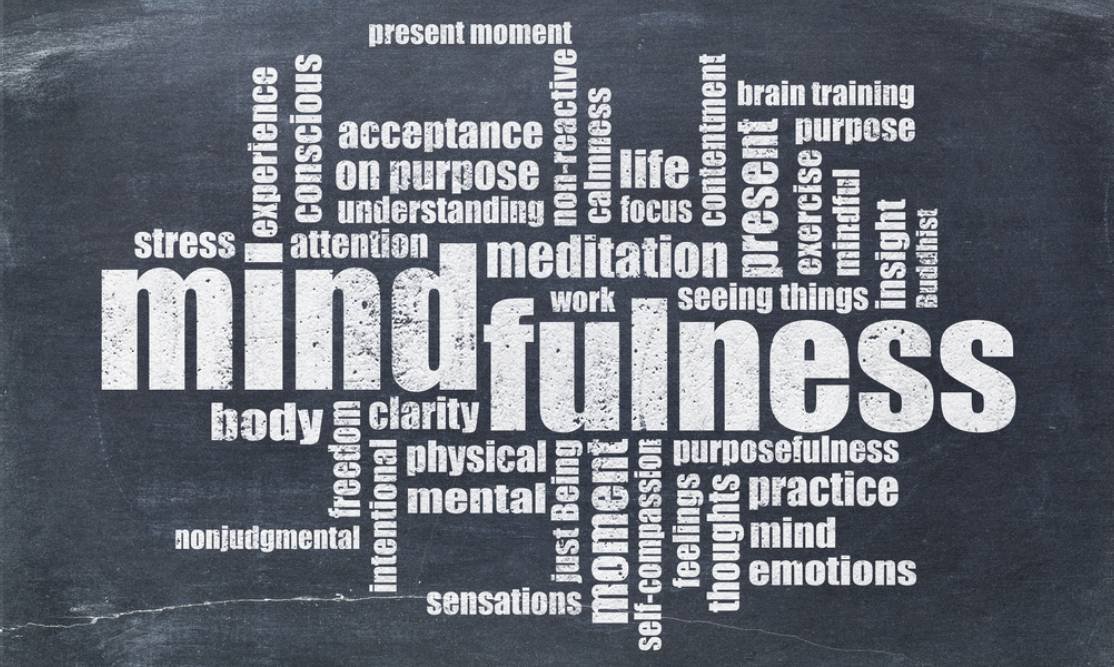
In the busy and demanding lives we have today, stress has become an ever-present reality, affecting countless individuals. The ceaseless demands of work, personal responsibilities, and societal expectations can exact a toll on our mental health and well-being. It is, therefore, becoming increasingly important for us to incorporate stress-management routines and practices in our daily lives, one such practice being “Mindfulness”.
Mindfulness, at its core, involves cultivating a heightened awareness of the present moment without judgment. This practice encourages individuals to be fully present in their experiences, fostering a deeper understanding of their thoughts and emotions.
It involves paying attention deliberately to the unfolding of each moment and observing thoughts and feelings without becoming entangled in them. While the roots of mindfulness trace back to Buddhist and other meditative traditions, its secular adaptation has allowed it to permeate various aspects of modern life, from psychology and medicine to education and corporate environments.
The first pillar of mindfulness is awareness – the conscious recognition of one’s thoughts, emotions, and sensations. Rather than allowing the mind to wander into the past or future, mindfulness encourages individuals to anchor their attention to the present moment. This heightened awareness serves as a powerful antidote to the “autopilot” mode that often dominates daily activities.

The second pillar is attention – the focused concentration on the current experience. This involves directing one’s awareness to the breath, body sensations, or the surrounding environment. By honing one’s ability to pay attention in this manner, individuals can break free from the barrage of intrusive thoughts that contribute to stress and anxiety. Mindful attention cultivates a sense of clarity.
The third pillar is acceptance – the non-judgmental acceptance of the present moment. Mindfulness invites individuals to observe their experiences without evaluating them as good or bad. This acceptance does not imply passive resignation but rather an acknowledgment of what is, allowing individuals to respond to situations with greater equanimity.
Benefits of Mindfulness:
The benefits of mindfulness are extensive, with a growing body of scientific research supporting its positive impact on mental health. Regular mindfulness practice has been associated with reduced stress, anxiety, and depression. It fosters emotional regulation, allowing individuals to respond to challenges with greater resilience. Moreover, mindfulness has been integrated into therapeutic approaches such as Mindfulness-Based Stress Reduction (MBSR) and Mindfulness-Based Cognitive Therapy (MBCT), demonstrating its efficacy in clinical settings.
1. Stress Reduction and Emotional Resilience
One of the most widely acknowledged benefits of mindfulness is its capacity to alleviate stress and foster emotional resilience. Mindfulness encourages individuals to bring their attention to the present moment, allowing them to detach from the constant stream of worries about the future or regrets about the past. Through techniques such as deep breathing and body scan meditations, individuals develop a heightened awareness of their thoughts and emotions, enabling them to respond to stressors with greater clarity and composure.
By cultivating a non-judgmental awareness of thoughts and emotions, individuals become better equipped to navigate life’s challenges with a greater sense of calm and equilibrium.
2. Improved Focus and Concentration
In a world characterized by constant distractions, the ability to maintain focus and concentration is a valuable skill. Mindfulness practice involves training the mind to stay anchored in the present moment, which, over time, enhances cognitive functions related to attention and concentration. Studies have shown that individuals who engage in regular mindfulness meditation exhibit improved attention span, cognitive flexibility and increased productivity.
3. Enhanced Emotional Intelligence
Mindfulness cultivates emotional intelligence by promoting a deeper understanding of one’s emotions and the emotions of others. As individuals become more attuned to their inner experiences, they develop greater empathy and compassion. Mindfulness practice involves acknowledging and accepting emotions without judgment, creating a space for individuals to respond to themselves and others with kindness and understanding.
Moreover, the increased self-awareness gained through mindfulness enables individuals to recognize emotional triggers and respond to challenging situations in a more thoughtful and measured manner. This heightened emotional intelligence not only strengthens interpersonal relationships but also contributes to a more harmonious and supportive social environment.
4. Better Physical Health
The mind-body connection is a central tenet of the mindfulness philosophy, and numerous studies have highlighted the positive impact of mindfulness on physical health. Regular mindfulness practice has been associated with lower blood pressure, improved immune function, and reduced inflammation. The relaxation response triggered by mindfulness counteracts the harmful effects of chronic stress on the body, contributing to overall better health.
Additionally, mindfulness-based interventions have been incorporated into treatment plans for various medical conditions, such as chronic pain, cardiovascular disease, and sleep disorders. By fostering a greater awareness of the body and its sensations, mindfulness empowers individuals to take proactive steps towards maintaining and improving their physical well-being.
5. Sleep Improvement
Quality sleep is essential for overall health and functioning, yet many individuals struggle with insomnia and disrupted sleep patterns. Mindfulness offers a natural and non-pharmacological approach to improving sleep. Mindful breathing and relaxation techniques can help calm the mind, and ease it into a restful sleep experience.
Mindfulness-based interventions for insomnia, such as Mindfulness-Based Stress Reduction (MBSR) and Mindfulness-Based Cognitive Therapy (MBCT), have demonstrated efficacy in promoting better sleep quality.
Mindfulness Techniques:
Various techniques facilitate mindfulness. Mindful breathing, where attention is focused on the breath, serves as a foundational practice. Progressive Muscle Relaxation and body scan exercises help ground individuals in the present moment by fostering awareness of bodily sensations. Guided meditation, mindful walking, and loving-kindness meditation are additional practices that cater to different preferences and needs.
1. Mindful Breathing:
- Find a quiet place to sit comfortably.
- Focus your attention on your breath.
- Inhale slowly and deeply through your nose.
- Exhale through your mouth, allowing tension to release.
- Repeat for a few minutes, bringing your attention back if your mind wanders.
2. Body Scan Meditation:
- Lie down or sit comfortably.
- Direct your attention to different parts of your body, starting from your toes to the top of your head.
- Notice any sensations without judgment.
- Release tension in each area as you become aware of it.
3. Mindful Walking:
- Take a slow walk, paying attention to each step.
- Notice the sensations in your feet and legs.
- Be aware of your surroundings, the sounds, and the smells.
- If your mind starts to wander, gently bring it back to the present moment.
4. Guided Imagery:
- Close your eyes and imagine a peaceful place.
- Engage your senses by visualizing the details – sights, sounds, smells.
- Immerse yourself in this mental sanctuary to promote relaxation.
5. Mindful Eating:
- Pay full attention to each bite of your meal.
- Notice the flavours, textures, and smells.
- Chew slowly and savour the experience.
- Avoid distractions like phones or TV during meals.
Conclusion:
In conclusion, Mindfulness is a powerful tool for stress reduction and overall well-being. By incorporating mindfulness techniques into their daily lives, individuals can navigate the challenges of the modern world with greater resilience and a sense of calm.
